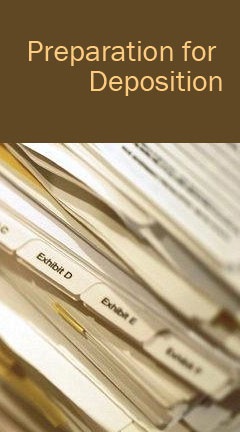Archival Notice
This is an archive page that is no longer being updated. It may contain outdated information and links may no longer function as originally intended.
Home | Glossary | Resources | Help | Course Map
Documents and Materials the Expert May Bring to Deposition
Preparing for deposition should be a joint effort between the expert and the proffering attorney(s). If no attorney is available (which may occur), the expert should proceed on his or her own.
Before a deposition, the expert should meet with the proffering attorney to determine the likely focus and scope of the testimony and what documents, if any, the expert is expected to produce. These items might include:
- All documents relating to any communication between the expert and opposing counsel, including such items as engagement letters.
- All documents regarding communication relating to the engagement, including any communications with witnesses.
- All documents relating to any preliminary opinions or conclusions.
- All documents consulted or relied upon by the expert in connection with the engagement, including those that were used to formulate preliminary opinions or conclusions.
- All documents relating to the expert's educational, employment and professional history, and any other documents reflecting or relating to the expert's qualifications to testify.
- Copies of all professional articles that the expert has written, either individually or as a contributing author.
- All documents reflecting or relating to other cases in which the expert has testified, including any documents (including transcripts) that reflect the substance of the expert's testimony, the terms of the expert's engagement, the court in which the action was pending, or the outcome of the case.
- All other documents relating to the engagement, the opinions the expert expects to give, or the opinions the expert was asked to consider giving.
Additional Online Courses
- What Every First Responding Officer Should Know About DNA Evidence
- Collecting DNA Evidence at Property Crime Scenes
- DNA – A Prosecutor’s Practice Notebook
- Crime Scene and DNA Basics
- Laboratory Safety Programs
- DNA Amplification
- Population Genetics and Statistics
- Non-STR DNA Markers: SNPs, Y-STRs, LCN and mtDNA
- Firearms Examiner Training
- Forensic DNA Education for Law Enforcement Decisionmakers
- What Every Investigator and Evidence Technician Should Know About DNA Evidence
- Principles of Forensic DNA for Officers of the Court
- Law 101: Legal Guide for the Forensic Expert
- Laboratory Orientation and Testing of Body Fluids and Tissues
- DNA Extraction and Quantitation
- STR Data Analysis and Interpretation
- Communication Skills, Report Writing, and Courtroom Testimony
- Español for Law Enforcement
- Amplified DNA Product Separation for Forensic Analysts


